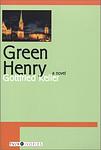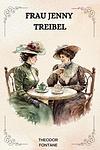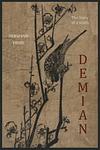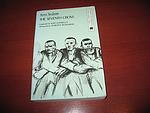Der Kanon (The Canon)
This is one of the 284 lists we use to generate our main The Greatest Books list.
-
The Sorrows of Young Werther by Johann Wolfgang von Goethe
This classic novel follows the emotional journey of a young artist named Werther, who falls deeply in love with a beautiful woman named Lotte, only to discover that she is already engaged to another man. His unrequited love and deep despair eventually lead him to take his own life. The story, told through letters written by Werther, explores themes of love, loss, and the tragic consequences of emotional turmoil.
-
Elective Affinities by Johann Wolfgang von Goethe
This novel explores the romantic relationships and social dynamics of four characters: a married couple, their close friend, and a young girl who becomes part of the household. The story is a study of how people's choices, passions, and societal norms can shape their relationships, often with tragic consequences. The narrative delves into themes of marriage, love, morality, and the intersection of personal feelings with societal expectations.
-
The Devil's Elixirs by E. T. A. Hoffmann
"The Devil's Elixirs" is a gripping tale of mystery and madness set in 18th-century Germany. The story follows a young monk who becomes entangled in a web of deceit and supernatural occurrences after unwittingly ingesting a mysterious elixir. As his sanity begins to unravel, he is forced to confront his darkest fears and confront the devil himself. With its haunting atmosphere and intricate plot, this gothic novel explores themes of identity, temptation, and the blurred boundaries between reality and illusion.
-
Green Henry by Gottfried Keller
"Green Henry" is a semi-autobiographical novel that chronicles the life of a young man who dreams of becoming a painter but faces countless obstacles on his journey. The protagonist leaves his Swiss village and travels to Munich to study art, but his lack of discipline and financial difficulties force him to return home. After his mother's death, he begins to reassess his life and eventually finds his place in society. The novel explores themes of identity, ambition, and the struggle between individual desires and societal expectations.
-
Frau Jenny Treibel by Theodor Fontane
"Frau Jenny Treibel" is a satirical novel set in late 19th-century Berlin, written by Theodor Fontane. The story revolves around the ambitious and social-climbing Treibel family, particularly Frau Jenny Treibel, who is determined to secure a noble match for her daughter. Through witty dialogue and humorous situations, Fontane explores the themes of social status, hypocrisy, and the clash between old and new money in German society.
-
Effi Briest by Theodor Fontane
This novel explores the life of a 17-year-old girl who is married off to a much older man, a high-ranking official, for the sake of social and financial stability. Despite her husband's devotion, she embarks on a passionate, but doomed affair with a charming, yet manipulative, major. The affair ends disastrously, leading to her social ostracization and eventual descent into loneliness and despair. The book serves as a critique of the rigid Prussian society of the late 19th century.
-
Buddenbrooks by Thomas Mann
"Buddenbrooks" is a novel that chronicles the decline of a wealthy north German merchant family over the course of four generations. The narrative focuses on the fluctuating fortunes and internal struggles of the family, reflecting the societal changes and economic decline of the period. The family's personal and business relationships, their moral values, and their struggle to maintain social status are all explored against the backdrop of the changing political and social landscape.
-
The Magic Mountain by Thomas Mann
In this novel, the protagonist, a young, ordinary man, visits his cousin at a tuberculosis sanatorium in the Swiss Alps. Intending to stay for only a few weeks, he ends up remaining there for seven years, becoming a patient himself. The book explores his experiences and relationships with other patients and staff, delving into philosophical discussions on life, time, and the nature of disease. It also provides a vivid portrayal of the European society and intellectual life on the eve of World War I.
-
Professor Unrat by Heinrich Mann
The novel is a social critique of bourgeois society in Germany during the Wilhelmine period, as seen through the life of an authoritarian and morally rigid school teacher. The protagonist becomes infatuated with a cabaret dancer, leading him to abandon his duties and societal norms, and eventually descend into madness. The book explores themes of obsession, social class, and the destructive power of repressed desire.
-
Beneath The Wheel by Hermann Hesse
"Beneath The Wheel" follows the story of Hans Giebenrath, a talented and ambitious young student who is sent to a prestigious boarding school. As he becomes consumed by the pressures of academic success and the expectations of his teachers and parents, Hans gradually loses touch with his own desires and passions. The novel explores themes of conformity, the damaging effects of excessive pressure, and the consequences of sacrificing one's individuality for societal approval.
-
The Confusions of Young Törless by Robert Musil
This novel explores the moral and psychological development of a young student sent to a military boarding school in Austro-Hungarian Empire. The protagonist witnesses and participates in the bullying and humiliation of a fellow student, leading him to question the nature of power, morality, and the thin line between civilization and barbarity. The book is a profound exploration of adolescence, authority, and the loss of innocence.
-
The Trial by Franz Kafka
The book revolves around a bank clerk who wakes one morning to find himself under arrest for an unspecified crime. Despite not being detained, he is subjected to the psychological torment of a bizarre and nightmarish judicial process. The story is a critique of bureaucracy, exploring themes of guilt, alienation and the inefficiency of the justice system.
-
Berlin Alexanderplatz by Alfred Döblin
Set in 1920s Berlin, the book follows the life of Franz Biberkopf, a man recently released from prison who is trying to make an honest life for himself. However, he is drawn back into the criminal underworld due to circumstances and the influence of his acquaintance, Reinhold. The book is a vivid portrayal of city life in Weimar-era Germany, exploring themes of poverty, crime, redemption and the struggle to maintain one's morality amidst chaos and corruption.
-
The Radetzky March by Joseph Roth
"The Radetzky March" is a historical novel that explores the decline and fall of the Austro-Hungarian Empire through the experiences of the Trotta family, across three generations. The narrative begins with Lieutenant Trotta, who saves the life of the Emperor during the Battle of Solferino, and follows his descendants as they navigate the complexities of life in the empire. The novel delves into themes of duty, honor, and the inevitability of change, painting a vivid picture of a society in decline.
-
The Seventh Cross by Anna Seghers
"The Seventh Cross" is a gripping tale set in Nazi Germany that revolves around seven men who escape from a concentration camp. The camp commandant erects seven crosses, vowing to hang each escapee on their return. The story primarily follows one escapee, who manages to evade capture and make his way back to his hometown. The narrative explores the psychological terror imposed by the Nazi regime, the resilience of human spirit, and the subtle forms of resistance within the German populace.
-
Die Strudlhofstiege by Heimito von Doderer
"Die Strudlhofstiege" is a sprawling novel set in Vienna during the early 20th century, exploring the interconnected lives of a diverse cast of characters. Through vivid and intricate storytelling, the book delves into themes of love, power, and the human condition, offering a panoramic view of a society on the brink of change. With its richly detailed descriptions and complex characterizations, the novel presents a captivating portrait of Vienna's social and cultural landscape, while also delving into the depths of human desires and aspirations.
-
Pigeons On The Grass by Wolfgang Koeppen
"Pigeons On The Grass" is a thought-provoking novel that explores the complexities of post-war German society. Set in a small town, the narrative intertwines the lives of various characters, each representing different social classes and ideologies. Through vivid descriptions and introspective musings, the author delves into themes of alienation, societal constraints, and the search for meaning in a rapidly changing world. With a keen eye for detail and a lyrical prose style, the book offers a nuanced portrayal of human nature and the struggles faced by individuals in the aftermath of war.
-
The Tin Drum by Günter Grass
The novel tells the story of Oskar Matzerath, a boy who decides on his third birthday that he will stop growing and remain a three-year-old forever. Oskar is gifted with a tin drum by his mother, which he uses to express his emotions and thoughts. Living in Danzig during the rise of Nazi Germany, Oskar's refusal to grow is a form of protest against the adult world. The book is a blend of magical realism and historical fiction, providing a unique perspective on the horrors of World War II and the post-war era in Germany.
-
Montauk by Max Frisch
"Montauk" is a poignant and introspective novel that explores the complexities of love, memory, and the passage of time. Through the lens of a middle-aged writer reflecting on his past romantic encounters, the book delves into themes of longing, regret, and the elusive nature of happiness. With lyrical prose and a deeply personal narrative, the story offers a profound meditation on the human condition and the fleeting nature of relationships.
-
Woodcutters by Thomas Bernhard
Woodcutters is a darkly humorous critique of Vienna's artistic elite. The story takes place over the course of a single evening, as the narrator attends a dinner party in honor of a recently successful actor. As the evening progresses, he reflects on the pretentiousness and hypocrisy of the guests, the mediocrity of their artistic achievements, and the tragic suicide of his former lover. The novel is a scathing indictment of the vanity and self-delusion of the artistic community.
Der Kanon, 20 Books
Der Kanon (German pronunciation: [deːɐ̯ ˈkaːnɔn], "The Canon") or more precisely Marcel-Reich-Ranickis Kanon is a large anthology of exemplary works of German literature.
Edited by the literary critic Marcel Reich-Ranicki (1920–2013), he called the anthology, announced on 18 June 2001 in the German news magazine Der Spiegel under the title
"The Canon of worthwhile German Works", his magnum opus. This list is not the full Canon, this is only the novels.
This list has a weight of 30%. To learn more about what this means please visit the Rankings page.
Here is a list of what is decreasing the importance of this list:
- Voters: 1 person voted
- List: only covers 1 specific country
If you think this is incorrect please e-mail us at [email protected].



















